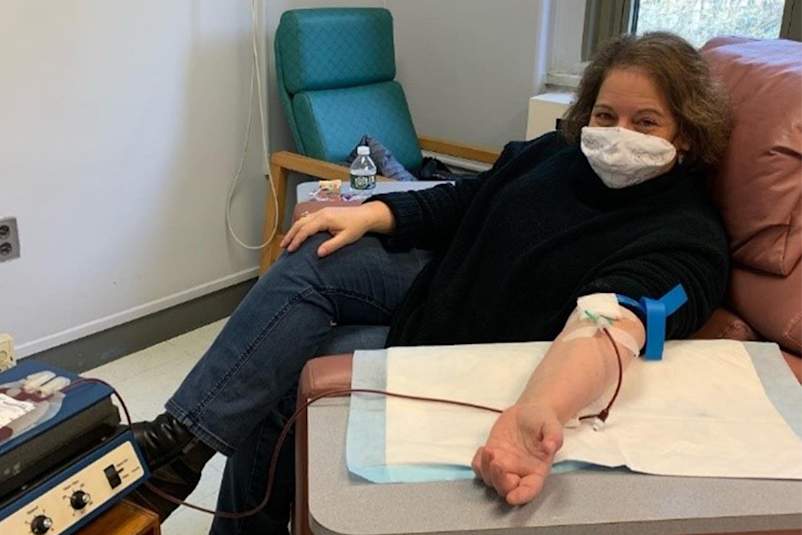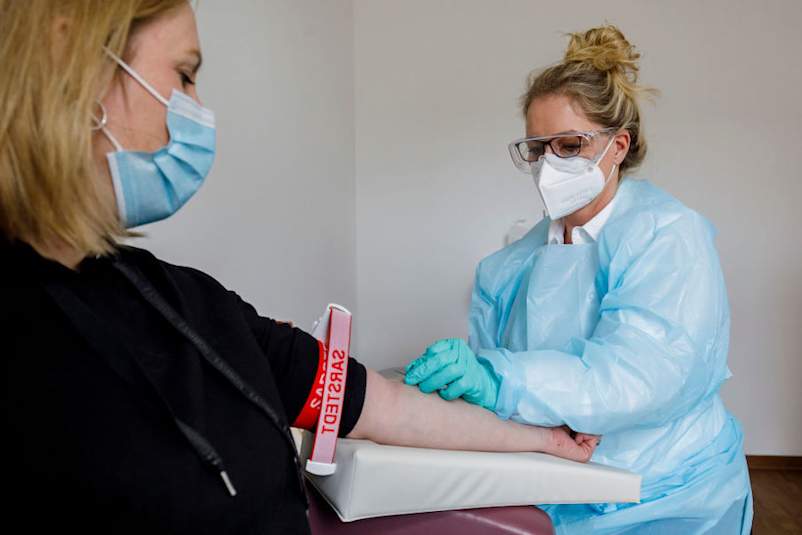In this strange new COVID-19 world, everyone is wondering:当这一切将结束?As lockdowns lift in different states, we all want to know when it'll be truly safe to return to work, school, and the fun activities of life.
The unsettling reality is that no one knows how long it will take for things to return to normal—and we won’t know until widespread testing is made available to confirm who’s positive out there, says Rashid Chotani, M.D., the vice president of Medical Affairs at CareLife Medical in Fairfax, VA. “Widespread testing is what enables us to discern disease incidence and prevalence, and to determine who has recovered from infection,” explains Dr. Chotani.
World Health Organization (WHO) Director-General Tedros Adhanom Ghebreyesus shares this view. This spring, he tweeted: “One of the main things we've learned in the past months about COVID-19 is that the faster all cases are found, tested, isolated & cared for, the harder we make it for the virus to spread. This principle will save lives & mitigate the economic impact of the pandemic.”
Antibody testing may help do this and more. That’s because there is still so much to discover about the novel coronavirus (it has only been infecting humans since late last fall). Many researchers suspect that if it behaves like most other viruses do, the presence of post-infection antibodies in our bloodstreamsmayprovide some level of immunity—and hopefully allow us to return to our regular lives.
What Are Antibodies, Anyway?
When you catch a virus, your body starts working immediately to counteract it. Your white blood cells produce proteins called antibodies in response to the infection, whose main job is to kick this "invader" out of your system. “The presence of an antibody indicates that someone has been exposed to that pathogen at some point,” says John Schmitz, Ph.D., associate director of the Clinical Microbiology/Immunology Laboratories at UNC Hospitals in Chapel Hill, NC.
Two types of antibodies in particular are important indicators for COVID-19. (They are produced in response to a variety of different infections—coronavirus is just one example.)
- IgM抗体(short for “immunoglobulin M”) indicates that someone was recently exposed or is currently fighting off an active infection.
- IgG抗体(你猜它 - “免疫球蛋白G”)的发展以后,它表明你已经发展到了病毒的免疫应答。而几周之内的IgM峰和淡入淡出,IgG抗体有时可以持续数月甚至数年,以提供保护从再感染的某一水平。
The level of protection these antibodies provide depends on the specific virus—and for COVID-19, scientists still aren’t sure whether immunity develops this way. But the hope is that these antibodies might indicate at least some level of protection against COVID-19, once someone has recovered from illness.
The important word there ismight。4月17日,世卫组织突发公共卫生事件计划署执行主任迈克尔·瑞安,医学博士警告说,“没有人知道是否有人对抗体具有疾病或发生再次暴露得到充分的保护。”科学家和卫生官员希望知道更多的在未来几个月内。
Why Is Antibody Testing Important?
为了知道是否有抗体COVID-19,你需要为他们的测试。与聚合酶链式反应(PCR)鼻拭子检测,它告诉你,如果你现在有COVID-19抗体测试有谁已经从病毒,即使恢复,如果这样的人从来没有表现出任何症状告诉我们的潜力,发生在所有情况下,至少25%,根据美国疾病控制和预防中心(CDC)。我们学习,以帮助制止社会上流传的人,他们的症状很轻微,他们可能不知道他们有COVID-19摆在首位,但继续与他人从事中,潜在的传播这种疾病,这一点尤为重要。
This is a really big deal. “The faster we can clear individuals from active disease state, the faster we can mitigate the socio-economic downturn and social disruption,“ explains Dr. Chotani. In other words, the more people we can test, the more experts will know about when it’s safe to reopen the economy again.
如何是抗体测试完成?
Karen Dukess, 57, is an author and mom of two living in New Rochelle, NY. She developed suspicious symptoms in early March, headed to Greenwich Hospital in Connecticut (under the instructions of her doctor) to do a drive-through test, and found outshe was positive for COVID-193月10日。
幸运的是,Dukess恢复在家里几个星期内。然后,她立即签署了得到她的血液在西奈山医院在曼哈顿抗体检测。她到达工厂于4月2日,她被赋予了面具,并获得在门口的温度检查。“当时有很多人在那里,两名等候室,”她回忆,描述了人们是如何刻意保持在彼此相距一定距离。
Dukess got her blood drawn and did a PCR test, to make sure she no longer had an active infection. Two days later, she was informed that she did have resistant antibodies to COVID-19. But to her surprise, she also tested positive once again for COVID-19 through the nose swab, even though she no longer felt sick. One week later, on April 10, she returned to Mount Sinai for a final nose swab test to confirm the virus was no longer present in her RNA—and, finally, she tested negative. Which cleared her for the next step: donating her plasma.
What Is Convalescent Plasma, and Why Might It Help?
Plasma is the medical term for the golden-colored part of blood containing antibodies, and it’s important because scientists can use it to study the COVID-19 resistant antibodies from recovered patients. Again, at this time it’s unclear whether antibodies indicate immunity—and that’s what scientists are working around the clock to find out. Since such antibodies may hold the key to ending the coronavirus pandemic, survivors are being asked to donate blood or plasma for research purposes.
什么是更多,美国食品药品管理局鼓励那些谁从COVID-19恢复到捐献血浆疗养的希望,它可以被用于治疗重病患者,通过重新恢复成他们的血液,以提高他们的免疫反应。当你捐血浆,医疗服务提供者将吸引你的血液,把它变成一台机器分离出血浆,然后重新注入血液回你的手臂休息。这仍然是在临床试验阶段,试验方法,但它已在其他传染病如SARS,MERS,和H1N1成功应用。
Dukess is hoping to donate her plasma at Mount Sinai, but she’s still waiting to hear back for follow-up instructions. In the meantime, she responded to a request for blood donors from Rockefeller University in Manhattan to participate in a series of studies on prevention and treatment of the virus. Researchers at Rockefeller are looking for “elite neutralizers,” a fancy term for antibodies so resistant to COVID-19 that they could be used to make a drug. In other words, scientists believe that a small group of people may have battled the virus so effectively that their antibodies could help create a cure.
4月17日,Dukess来到洛克菲勒献血。校园里几乎是空的。护士把她的生命体征,做了一个手指点刺测试的血红蛋白,然后画了约半血的袋子。“这是坦言最激动人心的日子里,我已经在一个星期,因为我去的地方,看到这么多的人,”她说。“感觉好做一些有用的东西。”她希望她与病毒早期的经验可以最终帮助防止其他人的安全。

Can I Become an Antibody Donor?
如果您在恢复COVID-19的患者(或你认为你可能有病毒),你可能能够donate blood or plasmato help with research efforts. The FDA’s website provides information about where you can donate, and from there, you can contact a representative in your area.
新建,抗体检测和实验性的治疗举办一些承诺。“来识别个人谁是IgM抗体阴性和IgG阳性是至关重要的,如果我们要恢复到正常一些,并打消劳动力流动性的能力,” Chotani博士说。施密茨队在UNC目前正在找出哪些抗体测试的模型是最准确的,并能以高音量使用。
Should I Get an Antibody Test?
随着抗体测试已经广泛使用hospitals and walk-in clinics, and even offered by some frontline employers (like grocery stores), you may be eager to find out if you have COVID-19 antibodies—and if you do, whether that indicates immunity. Unfortunately, at this point, immunity is still a big unknown. Doctors just don't for certain that this virus behaves like similar ones. The CDC advises that until additional data is available, no one should change their social-distancing habits or use testing results to make life decisions (like a visiting an elderly relative, say, or returning to the office). That's because, even with antibodies present, not even the scientific community knows with this particular virus if immunity is given, or how long it might last.
不过,也许你想知道,如果你已经接触过病,所以你想要做一个测试,找出。有近200个不同品牌的抗体测试,现在充斥市场,从FDA但只有其中的18已收到紧急使用审批。(见那些approved antibody tests here在18的),施密茨指出,许多是由已经产生非常准确,如果非COVID-19的相关公司,测试之前,这是一个好兆头制造。然而,其他人的短名单,更不用说额外的175个左右的测试包在那里,是由公司没有生产这种测试的历史创造。和准确性成绩一直都在地图上,以虚假结果的记录激增。所以,你要测试的准确性归结为特定品牌的测试您的医院或诊所的使用。
“没有理由,一个试验由医院实验室对定点护理现场[预约的诊所]执行将是本质上的不同,”施米茨说。“相反,精度差更可能是由于所使用的特定测试。基于医院的实验室通常会使用非常敏感的技术来检测抗体。一个预约的诊所会更倾向于使用快速测试。”
也就是说,如果您的测试被要求抽血医院做,像测试Dukess了,它可能会比通过预约的诊所做了手指点刺试验更准确。“五一”是这里的关键词,因为,再一次,这一切都取决于具体的测试您的医院使用。
According to the American Medical Association (AMA), most of remaining tests不among the 18 FDA-approved kits rely upon the manufacturer’s self-verification—meaning, there’s really no universal standard for assessing a test’s accuracy. “So many tests were rapidly developed early on that I am not surprised there was a large variation in accuracy,” Schmitz says. “We don’t know with certainty about the quality of the manufacturers of all the tests that have been marketed.” A false positive result could lead you to assume you’ve had COVID-19 when you haven’t, which could potentially put you—and others—in danger, should you eventually be exposed to the virus.
The AMA advises against individuals using antibody tests to make any assumptions about their health or futures, a point echoed by Schmitz. “The utility of an antibody test for an individual is very limited,” he says. “Antibody tests should not be used as the sole laboratory test to diagnose SARS-CoV-2 infection.” For now, he explains, antibody tests are best used by researchers to screen plasma donors and to conduct studies about general population exposure. As for individual immunity? Only more consistent and accurate testing, plus the science to show that antibodies actually deliver a degree of protection, can prove you have it.
Mount Sinai Antibody Testing:Mount Sinai. (2020.) “Mount Sinai Developing an ‘End-to-End’ Diagnostics Solution for COVID-19 That Incorporates Diagnosis, Treatment Selection, and Monitoring of Disease Control.”mountsinai.org/about/newsroom/2020/mount-sinai-developing-an-end-to-end-diagnostics-solution-for-covid-19-that-incorporates-diagnosis-treatment-selection-and-monitoring-of-disease-course-pr
Mount Sinai FDA Approval:Mount Sinai. (2020.) “Mount Sinai’s Blood Test to Detect Antibodies to COVID-19 Receives Emergency Use Authorization From U.S. Food and Drug Administration.”mountsinai.org/about/newsroom/2020/mount-sinais-blood-test-to-detect-antibodies-to-covid19-receives-emergency-use-authorization-from-us-food-and-drug-administration-pr
Convalescent Plasma COVID-19 Clinical Trials:Proceedings of the National Academy of Sciences of the United States of America。(2020.) “Effectiveness of convalescent plasma therapy in severe COVID-19 patients.”pnas.org/content/early/2020/04/02/2004168117
FDA血浆捐献:美国食品和药物管理局。(2020年)“捐赠COVID-19等离子。”fda.gov/emergency-preparedness-and-response/coronavirus-disease-2019-covid-19/donate-covid-19-plasma
FDA Convalescent Plasma Research: U.S. Food and Drug Administration. (2020.) “Recommendations for Investigational COVID-19 Convalescent Plasma.”fda.gov/vaccines-blood-biologics/investigational-new-drug-ind-or-device-exemption-ide-process-cber/recommendations-investigational-covid-19-convalescent-plasma
Rockefeller University Antibody Study:Rockefeller University. (2020.) “Scientists are using 'elite' antibodies from COVID-19 survivors to develop potent therapies.”rockefeller.edu/news/27956-scientists-using-elite-antibodies-covid-19-survivors-develop-potent-therapies/


